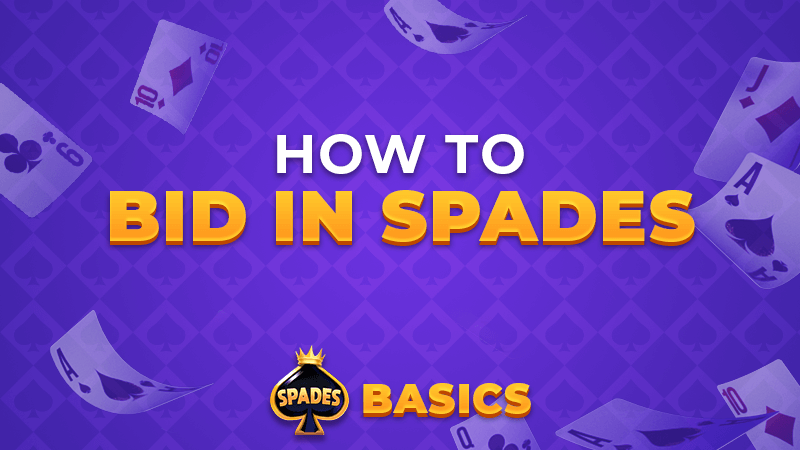Understanding Bidding in Spades

For beginners, bidding can feel intimidating. How do you know what to bid? What if you guess wrong? Should you risk a Nil? In this guide, we’ll break down the bidding process step by step, explain the different types of bids, and walk through examples so you’ll feel confident the next time you sit down at a Spades table.
1. The Basics of Bidding
After the cards are dealt, bidding begins with the player to the dealer’s left and continues clockwise. Each player declares how many tricks they expect to win, anywhere from 1 to 13. If you think you can win 3 tricks, you bid 3.
Your bid is not just about you, though – it combines with your partner’s bid to form your team contract. For example:
- You bid 3 tricks.
- Your partner bids 4 tricks.
- Together, your team contract is 7 tricks.
That means, as a partnership, you must win at least 7 tricks in the round. If you succeed, you score points. If you fail, your team is penalized.
Key points to remember:
- The minimum bid is 1; you cannot pass.
- The maximum bid is 13, which means you’re promising to win every trick.
- Spades are always trump, meaning they beat any other suit.
Example: Standard Bidding
Imagine you are dealt:
Ace♠, King♠, 7♠
Ace♥, 10♥
King♦, 9♦
Queen♣, 8♣, 5♣
Looking at this hand, you can already count at least 3 sure winners: Ace♠, King♠, and Ace♥. The King♦ might also take a trick if the Ace♦ has already been played.
A safe bid here is 3. Your partner might bid 4, so together you’re aiming for 7 tricks.
If you play carefully, you may win more than your bid, but the important thing is securing your contract first.
Example: Overbidding
Sometimes, beginners make the mistake of bidding too high. Suppose you’re dealt:
Jack♠, 9♠, 8♠
Queen♥, 9♥
10♦, 7♦
King♣, 6♣, 4♣
You might feel optimistic and bid 4. But realistically, your only reliable trick is King♣ (if the Ace♣ has been played). Your Spades are too low to guarantee wins. A bid of 2 would be much safer.
Overbidding is one of the fastest ways to lose points in Spades.
2. Scoring Your Bid
Bidding in Spades isn’t just about making promises – it’s about scoring points.
- If your team makes its contract: you score 10 points per trick bid.
- Any tricks you win beyond your bid count as 1 point each. These are called bags.
- Too many bags over time (often 10 bags) lead to a penalty, so you can’t rely only on overtricks.
- If you fail to make your contract, you lose 10 points per trick bid.
Let’s say your team bids 7 tricks and wins 8:
- You earn 70 points for the bid (7 × 10).
- Plus 1 extra point for the additional trick.
- Total: 71 points.
But if you win only 6 tricks, you lose 70 points, and the round goes to your opponents.
3. What Is a Nil Bid?
In addition to bidding numbers, players can also bid Nil. This is one of the most exciting and risky parts of Spades.
- A Nil means you promise to take zero tricks for the round.
- If you succeed, your team earns a large bonus, usually 100 points.
- If you fail and win even a single trick, your team is penalized 100 points.
When to bid Nil
A Nil bid works best when:
- Your hand has very few high cards (especially no high Spades).
- Your off-suit cards are low (e.g., 2, 3, 4 of Hearts).
- Your partner understands how to cover you by taking tricks when needed.
When to avoid Nil
Don’t bid Nil if you have:
- The Ace of Spades or another very high Spade.
- Multiple high cards in the same suit (e.g., Ace and King of Diamonds).
- A hand with strong potential for tricks, since you’ll likely fail the Nil.
Example: Nil Bid
Now imagine this hand:
3♠, 5♠, 9♠
2♥, 4♥, 7♥
3♦, 5♦, 8♦
2♣, 6♣, 10♣
This is a weak hand with no Aces, Kings, or high Spades. You’re very unlikely to win a trick on accident. This is a strong candidate for a Nil bid.
If you declare Nil, your partner’s role becomes crucial. Let’s say someone leads with King♥, and you play 2♥. You’re safe. But if someone plays a low Spade later, you might be forced to play your 9♠ – which could accidentally win if no one plays higher. Your partner can cover by using one of their higher Spades to ensure you don’t take the trick.
4. Tips for Beginners
Count your guaranteed winners first
Always start by identifying cards that are almost certain to win: Ace of Spades, King of Spades (if the Ace isn’t out yet), or high Aces in side suits.
Add potential winners carefully
Cards like Queens and Jacks might win if opponents’ higher cards are already played. Don’t count them as sure winners, but keep them in mind as possibilities.
Don’t overbid
A safe contract is better than a failed one. Bid what you know you can take, not what you hope for.
Work with your partner
Your bids should complement each other. If your partner bids low, you may need to step up if you have a stronger hand.
Be cautious with Nil
Nil can swing a game, but only when the hand is truly weak. If you have even one certain winner, don’t risk it.
Pay attention to table talk (without words)
The bids themselves give clues. If an opponent bids high, expect them to have strong Spades. Adjust your play accordingly.
5. Common Mistakes Beginners Make
- Bidding too high: Optimism often leads to penalties.
- Forgetting about bags: Winning extra tricks may seem good, but collecting too many hurts in the long run.
- Failing Nil because of carelessness: One accidental win can erase 100 points.
- Not working with your partner: Remember, Spades is a partnership game. Isolated thinking rarely works.
Remember: a steady, reliable bid often wins more games than wild risks. As you gain confidence, you’ll develop your own bidding style – and that’s when Spades becomes truly exciting.

